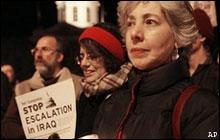Advertisement
The Anti-War Movement Today
Resume
In 1969, at the height of the country's anguish over the Vietnam War, just over half of Americans said that war was a mistake, and the streets and campuses and airwaves were full of wild protest.
Now, in January 2007, two-thirds of Americans say they oppose the Iraq War. But the opposition has a different feel this time. Merle Haggard and Pearl Jam and M&M and Neil Young are singing "get out of Iraq." There have been and will be more marches and protests.
Cindy Sheehan camped out in Crawford. But the anti-war movement this time has new terrain, too. Hugely, on the web. And, deliberately, deep in — not out — of mainstream politics.
This hour On Point: the Iraq War and the anti-war movement this time around.
Quotes from the Show:
"I think this is an extremely important moment for the antiwar movement and certainly for the country and the Middle East region. The antiwar movement was very much involved in the [2006] Congressional elections. Time, energy and resources went into those elections and we elected a Democratic Congress and we did so with the Iraq issue so prominently part of that election, specifically for the purpose of having the Democrats in Congress step up and stop the President certainly from escalating the war but our intention was to stop this war." Tom Andrews
"We began with military families speaking out in 2002 to try and prevent the U.S. invasion of Iraq. We are now over 3,2000 military families speaking out to end the US military occupation of Iraq, bring our troops home now, and take care of them when they get here. Our focus at this moment is really on Congress. Since the President's speech last Wednesday, we've had 60 new military families join the organization to speak out to bring this to an end, and we think the focus right now has to be on Congress and getting them to use their power of the purse to cut off all funds for continuing and escalating the war." Nancy Lessin
"There's a growing sense of the need for active resistance in addition to what obviously was very important political initiative around the last election. But I think there's a great need for people on the streets, for members of our churches to give much more prominent voice to their resistance to this war and to the current strategy and indeed to the whole response to September 11 which, in my mind, has been a very clever manipulation of fear and the creation of the notion of an axis of evil over against which the United States is a unilateral responder. And I think that's done great mischief and raises profound moral questions that the church and many other civil society organizations need to confront." Rev. John H. Thomas
"We've got two poles here. On the one hand, the Democrats only pass a resolution which has no teeth in it and the war keeps going and that adds to the frustration. On the other hand, if the antiwar movement becomes too radical, then it can breed a lot of resentment against it, as happened to a degree to the Vietnam War era as well. ... And the difference now with the 60s too is that there really is not a very large radical movement out there." Michael Kazin
"I think there's a lot of energy coming from students but definitely not enough right now. There's a lot of passivity among the student population. ...A lot of people don't realize the impact they can have on US foreign policy. I think what we need to do is empower people, let them know that what they do is important." Kate Flanagan
Guests:
Tom Andrews, former U.S. Congresman representing Maine. He now heads up "Win without War."
Nancy Lessin, co-founder of "Military Families Speak Out"
Michael Kazin, professor of history at Georgetown University
Rev. John H. Thomas, General Minister and President of the United Church of Christ.
Kate Flanagan, member of Students Against War at University of California Santa Cruz.
This program aired on January 16, 2007.